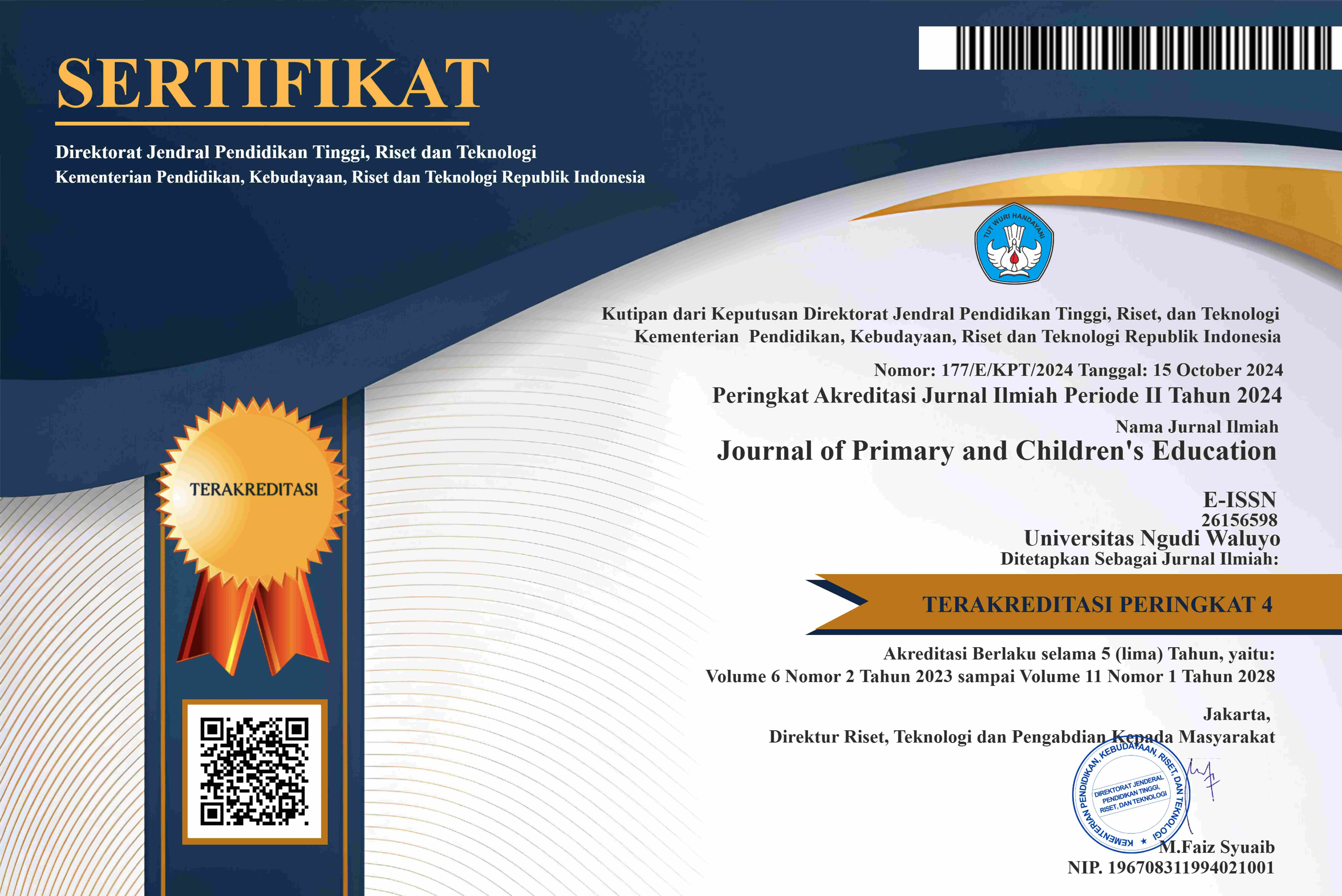PENGARUH TIPE KEPRIBADIAN TERHADAP HASIL BELAJAR MATEMATIKA DENGAN INTERVENSI METODE TIME QUIZ
DOI:
https://doi.org/10.35473/jnctt.v4i2.1160Abstract
Personality type is a trait that every student has. Personality type will affect the learning outcomes of mathematics after intervention with themethod time quiz. This study entitled "The Influence of Students' Personality Types on Mathematics Learning Outcomes WithMethod Intervention Time Quiz" with the formulation of the problem whether the differences and comparisons of student learning outcomes based on students' personality types. This study aims to determine the differences and comparisons of student learning outcomes based on students' personality types.The research method used is a quantitative method with aresearch quasi-design experimentaltype One-Shot case study. The sample in this study was class V SD Muhammadiyah Ambarawa, totaling 24 students with a sampling technique, namely the saturated sample technique.Based on the results of the t-test analysis (Paired Sample T-Test), it is obtained that the t-count is smaller than the t-table, namely 0.283 <1.782. So it can be concluded that there is no difference in the mathematics learning outcomes of studentspersonality extrovert withand the mathematics learning outcomes of students withpersonalities introverted who are given themethod time quiz. In this study also resulted that students who have anpersonality extroverted are higher with an average value of 6.50. The average value is greater thanberpekribadian students introvet with an average score of 6.33.
References
Ai, S. (2016). Pengaruh Model Pembelajaran Team Games Tounamaent(TGT) Terhadap Hasil belajar Matematika. Jurnal SAP Vol., 1(1), 45–53.
Almanca, Y., ÖğretÄ°mÄ°, K., Kelime, E., Hakkındaki, Ö., Çal, P., ErdoÄŸan, E., TEMÄ°ZYÃœREK, F., Malmkjaer, K., Enst, M., Tez, S., Do, M. A. N. Y. R. D., Sarig, E. C. E., Eyl, D., Tez, S., Indonesia, G. B., Enst, M., Dani, T. E. Z., Ulu, T. F., Ozdemirel, A. Y., … Kelimeler, A. (2015). No 主観的å¥åº·æ„Ÿã‚’ä¸å¿ƒã¨ã—ãŸåœ¨å®…高齢者ã«ãŠã‘ã‚‹ å¥åº·é–¢é€£æŒ‡æ¨™ã«é–¢ã™ã‚‹å…±åˆ†æ•£æ§‹é€ 分æžTitle. Contemporary Psychology: A Journal of Reviews, 1(4), 1–6. https://doi.org/10.1111/j.1540-4781.1969.tb04998.x
Anatasya, A. E. F. (2017). Identifikasi Kepribadian Dengan Menggunakan Algoritma Genetika. E-JURNAL JUSITI: Jurnal Sistem …, 1, 1–9. http://ejurnal.dipanegara.ac.id/index.php/jusiti/article/view/41
Aziz, A. (2010). Pengaruh Metode Pembelajaran Dan Tipe Kepribadia. 1–30.
Husain, B., & Ibrahim, I. (2019). Perbedaan Prestasi Belajar Bahasa Inggris Siswa Ditinjau dari Tipe Kepribadian Introvert dan Extrovert. Qalam : Jurnal Ilmu Kependidikan, 7(2), 91. https://doi.org/10.33506/jq.v7i2.371
Model, P., Kooperatif, B., Tps, T., Kepribadian, D. A. N., Kemampuan, T., Masalah, P., Kelas, D. I., Kecamatan, V. S. D., Kota, B., & Mardicko, A. (2017). JURUSAN PENDIDIKAN DASAR PROGRAM PASCASARJANA FAKULTAS ILMU PENDIDIKAN.
Mussardo, G. (2019). 済無No Title No Title. Statistical Field Theor, 53(9), 1689–1699. https://doi.org/10.1017/CBO9781107415324.004
Rambe, K., Sinaga, S., Sarjana, P., Ekonomi, P., Medan, U. N., & Belajar, H. (n.d.). Analisis Perbandingan Tipe Kepribadian Dengan Hasil Belajar Ekonomi. 184–190.
Ulya, N. M. (2017). Nadwa. Nadwa, 10(1), 1–25. http://journal.walisongo.ac.id/index.php/Nadwa/article/view/867/769
Published
How to Cite
Issue
Section
License
Copyright notice:
- Authors retain copyright and grant the journal right of first publication with the work simultaneously licensed under Creative Commons Attribution License that allows others to share the work with an acknowledgement of the work's authorship and initial publication in this journal.
- Authors are able to enter into separate, additional contractual arrangements for the non-exclusive distribution of the journal's published version of the work (e.g., post it to an institutional repository or publish it in a book), with an acknowledgement of its initial publication in this journal.
- Authors are permitted and encouraged to post their work online (e.g., in institutional repositories or on their website) prior to and during the submission process, as it can lead to productive exchanges, as well as earlier and greater citation of published work (The Effect of Open Access)







